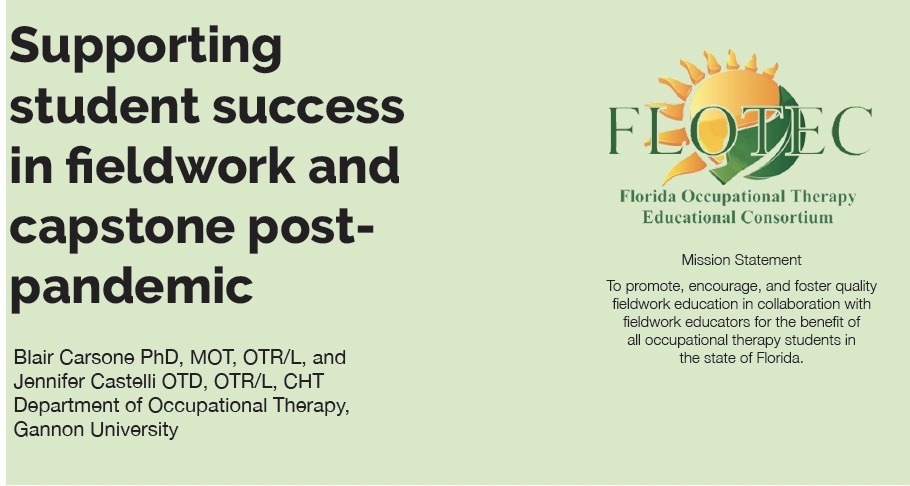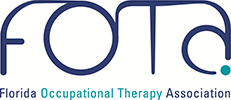Supporting student success in fieldwork and capstone post pandemic

As occupational therapy students have returned to campuses across the country, educators notice the impacts of a post-pandemic student population. More specifically, those of us who facilitate fieldwork and capstone experiences are seeing a shift in the needs of the students and their educators/mentors. Fieldwork coordinators notice that occupational therapists are leaving sites or transferring to better opportunities more rapidly post-pandemic. Healthcare workers, in general, continue to have a high turnover rate, especially women with children under five years of age (Van Beusekom, 2022). Capstone coordinators are seeing fewer mentors working on site as telework is still very prevalent, with more than a third of households working from home more frequently (Marshall et al., 2021). A fieldwork experience alone is stressful and challenges a student’s ability to communicate, receive feed- back, demonstrate professionalism, and clinically reason (Karp, 2020). Adding in the increases of stress and anxiety from the pandemic for all parties involved; this combination can become lethal to the success of the best students (Ganesan et al., 2022).
Understanding the impacts of a high turnover rate for healthcare professionals, the continued prevalence of telework, combined with a general increase in stress and anxiety, not only for students but all parties, is essential for fieldwork and doctoral capstone coordinators to analyze. Creating a strategy to minimize the impact of stress on students and devising several backup plans to mitigate last-minute changes will go a long way in supporting student success. Communication is also the key ingredient used by fieldwork and doctoral capstone coordinators to equip students for the current climate of the healthcare world. Preparing students with proper education and skill sets for fieldwork and capstone can be accomplished in pre-fieldwork skills workshops (Brown et al., 2021).
Utilizing pre-fieldwork skills workshops outlined by Brown et al. (2021) would provide an opportunity to emphasize skills that will support mental and physical health, generating an outcome of an improved understanding of the protective factors identified for successful fieldwork and work experiences. Students must survive in systems, once stable and predictable, now increasingly chaotic with layers of new billing and coding regulations, varying Covid requirements, and significant staffing changes. These circumstances contribute to challenges in building solid mentor/mentee relation- ships during a short time when much is at stake. Starting pre-field- work skills workshops in the first semester will allow fieldwork and capstone coordinators to ensure they know and understand the individual student’s personality, strengths and blindspots so there can be team building toward resilience characteristics early on.
Resilience and self-awareness are key factors in emotional intelligence, a foundation for the therapeutic use of self in occupational therapy (Andonian, 2017). Carmean et al. (2021) analyzed student success at seventeen universities post-pandemic. They found efficacy, advising, empathy, social support, and equity were significant aspects for fieldwork and doctoral capstone coordinators to educate their students and their educators/mentors. Coordinators can utilize the elements found by Carmean et al. (2021) to help ensure both the students and the educators/mentors are successful.
Infusing our occupational therapy tenets with the findings allows us to promote student success in fieldwork and capstone experiences. Efficacy in communication between coordinators, students, and educators/mentors while respecting an individual’s preferred communication style, i.e. text, email, etc.. Advising the students and educators/mentors of expectations and providing advice if any issues arise. Emulating empathy when things change or obstacles present a challenge so our students and educators/mentors feel seen. Providing social support by guiding students and educators/mentors to be open and honest throughout the experience. Exemplifying equity with site selections and transparency can allow students to grasp the daily challenges that fieldwork and doctoral capstone coordinators face.
Fieldwork coordinators, doctoral capstone coordinators, students, fieldwork educators, and doctoral cap- stone mentors can all do their part to grant one another grace post-pandemic when everyone feels the weight of the world. In a fast-paced, ever-changing healthcare system and growing telework society, it has never been more vital to invest the time to ensure we equip our students with protective factors, especially resilience. Coming from a place of understanding and being open can help our students grow into the clinicians we hope to share with the profession.
References
Andonian, L. (2017). Emotional intelligence: An opportunity for occupational therapy. Occupational Therapy in Mental Health, 33(4), 299-307. https://doi.org/10.1080/0164212X.2017.1328649
Brown, T., Yu, M. L., Hewitt, A., Cousland, R., & Etherington, J. (2021). Professionalism, resilience, and reflective thinking: How do these influence occupational therapy student fieldwork outcomes?. Occupational Therapy in Health Care, 1-26. https://doi.org/10.1080/ 07380577.2021.1978606
Carmean, C., Kil, D., & Baer, L. (2021). Why data matters for student success in a post-pandemic world. EDUCAUSE. https://er.edu- cause.edu/articles/2021/8/why-data-matters-for-student-success- in-a-post-pandemic-world
Ganesan, B., Fong, K. N. K., Meena, S. K., Prasad, P., & Tong, R. K.Y. (2021). Impact of COVID-19 pandemic lockdown on occupational therapy practice and use of telerehabilitation - A cross-sectional study. European Review for Medical and Pharmacological Science, 25(9), 3614-3622. https://doi.10.26355/eurrev_202105_25845
Karp, P. (2020). Occupational therapy student readiness for transi- tion to the fieldwork environment: A pilot case study. Open Journal of Occupational Therapy, 8(4), 1-14. https://doi.org/10.15453/2168-6408.1719
Marshall, J., Burd, C., & Burrows, M. (2021). Those who switched to telework have higher income, education, and better health.
United States Census Bureau. https://www.census.gov/library/sto- ries/2021/03/working-from-home-during-the-pandemic.html
Van Beusekom, M. (2022). Healthcare workers report high job turn- over amid pandemic. Center for Infectious Disease Research and Policy. https://www.cidrap.umn.edu/news-perspective/2022/04/ healthcare-workers-report-high-job-turnover-amid-pandemic
